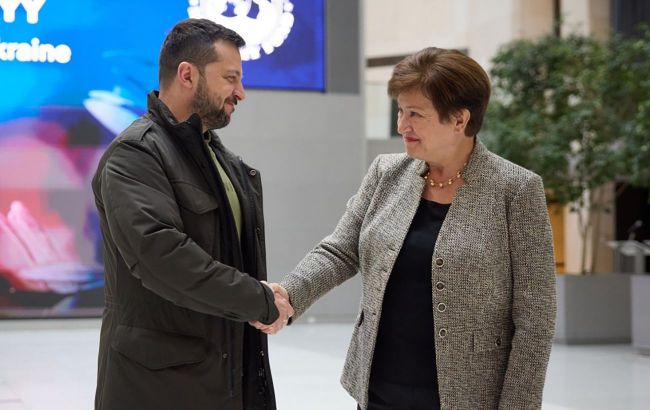IMF keeps funding Ukraine amid looming economic shock
 Photo: Volodymyr Zelenskyy and IMF Managing Director Kristalina Georgieva (president.gov.ua)
Photo: Volodymyr Zelenskyy and IMF Managing Director Kristalina Georgieva (president.gov.ua)
IMF shows flexibility in funding Ukraine and warns of potential economic shock in the near future.
Some details from the updated version of Ukraine’s memorandum with the IMF are outlined in the RBC-Ukraine report.
Key questions:
-
Ukraine has drawn two-thirds of its IMF loan
-
IMF sets new conditions for continued funding
-
An economic "shock" may occur in Q3
On July 1, Ukraine received the ninth tranche of its IMF loan, amounting to approximately $500 million. Under the four-year Extended Fund Facility (EFF) agreement signed between Ukraine’s government and the IMF in March 2023, Kyiv has now received $10.6 billion out of the total $15.6 billion.
All funds from the latest tranche, as with the previous eight, will be directed toward budget expenditures. "The funds will be used to cover priority budget expenditures," said Prime Minister Denys Shmyhal.
The IMF mission conducted a program review back in May. For the IMF Executive Board to approve the disbursement, Ukraine's government needed to adopt a budget declaration for 2026–2028 and prepare a customs reform plan as a prior action. These conditions were met, allowing the IMF board to issue a positive decision.
New commitments
The updated version of the IMF memorandum includes four new structural benchmarks and extends the deadlines for four previously established ones.
New structural benchmarks:
-
By the end of August - the Strategic Investment Council must present a project implementation plan
-
By the end of October - a roadmap for substantial financial market reform aimed at attracting private capital must be prepared
-
By the end of December - asset valuation procedures must be updated
-
By the end of March 2026 - legislative amendments related to mortgage bonds must be drafted
Benchmarks with revised deadlines:
-
The appointment deadline for the head of the Specialized Anti-Corruption Prosecutor’s Office has been moved from the end of June to the end of December 2025
-
The deadline for completing an independent integrity and compliance review of the National Securities and Stock Market Commission has been extended from the end of June to the end of August
-
Preparation of a law on critical third-party risk in the financial sector has been postponed from the end of September 2025 to the end of June 2026
-
Publication of the audit of the National Energy and Utilities Regulatory Commission has been pushed back from the end of October to the end of December 2025
Negative scenario and potential economic shock
The updated version of the IMF memorandum still assumes that the war in Ukraine will end in the second quarter of 2026. However, the main shock is projected to occur in the third quarter of 2025.
The term "shock" refers to a potential decline in GDP in the event of an escalation at the front and intensified fighting. For now, the IMF forecasts economic growth of 2–3% this year, though the outlook remains uncertain.
IMF shows flexibility in its cooperation with Ukraine
Given the current difficult situation and the uncertainty surrounding future developments, the IMF is not insisting on radical measures.
Tax increases, including VAT, are foreseen but only as a last resort. No such increases are expected this year. However, the simplified taxation system may be revised as early as 2027. Authorities intend to limit its use by large businesses. A transition to a more progressive personal income tax scale is also planned (currently, the personal income tax rate is 18%).
Tariff increases for utilities are also on the agenda, but only after the war ends.
"IMF is showing flexibility and adaptability due to the constant changes in Ukraine’s circumstances. The war continues, factors are evolving, and so are forecasts. Following the most recent program review, only a few sharp edges were adjusted," financial analyst Andriy Shevchyshyn told RBC-Ukraine.
The volume of financial inflows from the IMF into Ukraine’s budget remains limited. This year, Ukraine is expected to receive $2.7 billion from the Fund, while repaying $1.8 billion in legacy debt.
However, continued stable cooperation with the IMF is critical to securing funding from other donors, particularly from the EU under the Ukraine Facility program.
Under this program, Ukraine is set to receive €50 billion in loans and grants between 2024 and 2027. The funds are intended for budgetary support, reforms, and modernization.
Still, even if Ukraine meets all the necessary requirements, there is no absolute guarantee that the full amount of funding will be disbursed this year. The main risks — both substantial — are the duration of the war and the consistency of foreign support.
If hostilities continue beyond mid-2026, the IMF will need to revise the parameters of its program.
As previously reported, the IMF has provided Ukraine with tax-related recommendations. These include modernizing the tax and customs systems, combating tax evasion, and aligning legislation with EU standards.
The Fund also recommended strengthening the role of the exchange rate as a shock absorber — i.e., refraining from excessive currency interventions aimed at short-term price stabilization.

